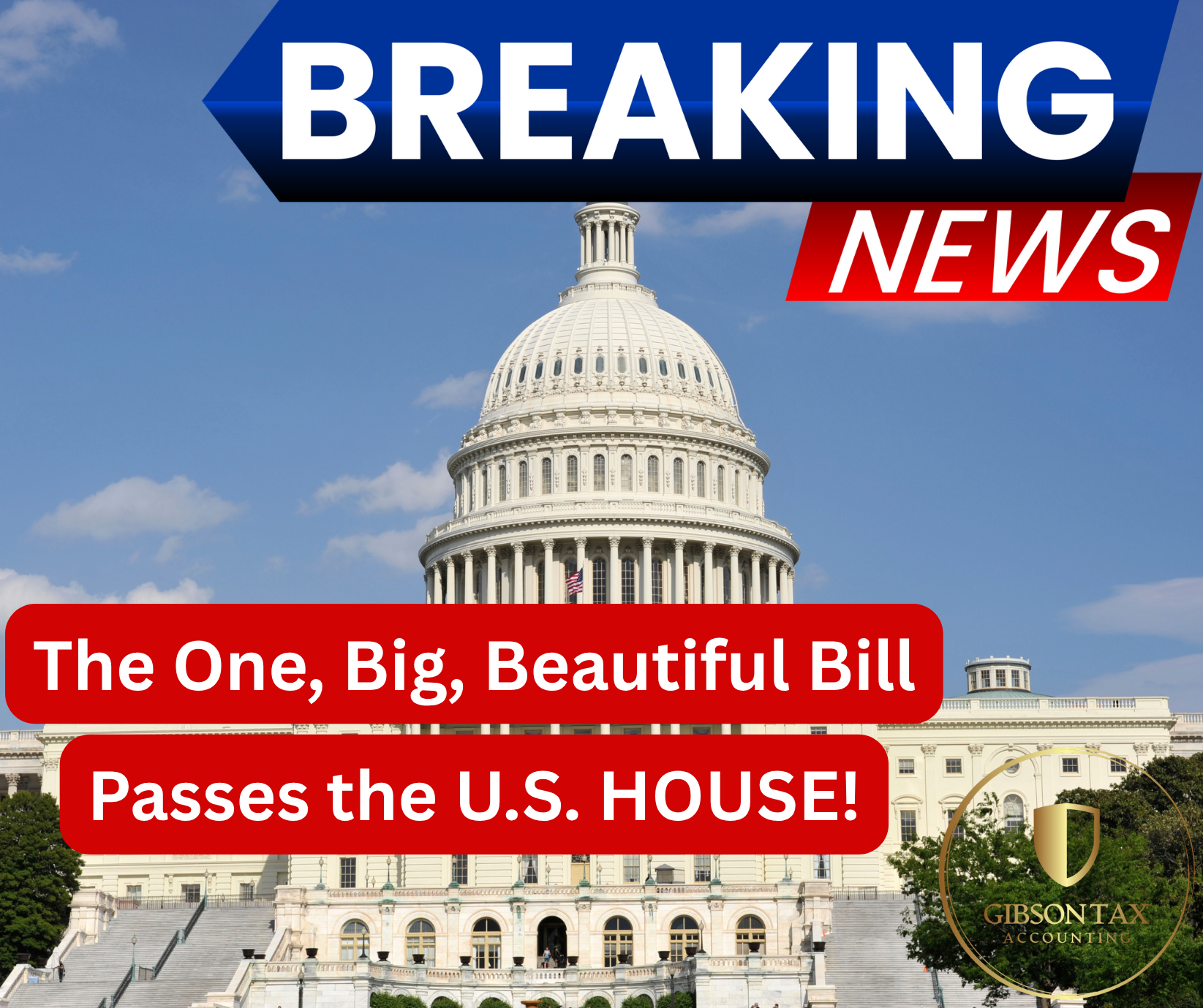The Big Beautiful Bill just passed the House, and if you live or run a business in North Carolina, you need to know what’s coming. The House approved President Trump’s massive tax and spending bill early Thursday morning by just one vote—215 to 214. Now it’s heading to the Senate, where things will likely get interesting. Here at Gibson Tax in Asheboro, we’re keeping a close eye on this because it could mean real money in your pocket.
Here’s What This Could Mean for Your Family
Let’s talk numbers. According to the folks who crunch these things, the Big Beautiful Bill could put up to $13,300 more in take-home pay for typical families and up to $11,600 more in wages for workers. I know those sound like big promises, but these come from the Council of Economic Advisers—not some campaign flyer.
The economic projections show the country’s GDP growing by about 5.2 percent over four years. What does that mean for North Carolina? We’re looking at potentially millions of new jobs nationwide, and our state should grab a good chunk of that growth, especially with all the business incentives packed into this bill.
Source: House Ways and Means Committee, Council of Economic Advisers
Small Business Owners, This One’s for You
If you own a small business in North Carolina, pay attention. This bill could save you serious money. The Section 199A small business deduction gets bumped up to 23 percent and becomes permanent. That’s huge for local businesses trying to compete.
Plus, you get 100 percent immediate expensing for equipment and machinery. Translation? Buy that new piece of equipment and write the whole thing off this year instead of depreciating it over several years. That’s cash flow you can actually use.
The bill also kills that annoying 1099-K rule that would’ve made you report every Venmo and PayPal transaction over $600. Instead, they’re raising the 1099-MISC threshold to $2,000, and also increases the threshold for third-party settlement organizations to $20,000 and 200 transactions. In a nutshell, less paperwork headaches for everyone.
But here’s the thing—the Senate still has to vote on this. Some senators have expressed concerns about certain provisions, especially those affecting clean energy programs. Since North Carolina has a growing renewable energy sector, we’ll need to watch how that plays out.
What Families Can Actually Expect
Here’s what the Big Beautiful Bill means for your family’s bottom line. You’d get an extra $1,300 tax cut on top of making the 2017 Trump tax cuts permanent. Without this bill, families would face a 22 percent tax hike—basically losing nine weeks’ worth of grocery money.
The bill also delivers on those campaign promises about “no tax on tips.” Here’s what that actually looks like:
- Overtime workers could save up to $1,750 per year
- Tipped workers could save $1,700 annually
- Seniors could see up to $450 in relief
The Child Tax Credit stays doubled, and so does the standard deduction that 91 percent of taxpayers use. No surprises there—just keeping what’s already working.
Good News for North Carolina Farmers
If you’re farming in North Carolina, this bill has some real benefits. The Death Tax Exemption gets doubled and made permanent, which protects family farms from estate taxes that often force families to sell land that’s been in their family for generations.
The Opportunity Zone program also gets renewed with extra focus on rural areas. That could mean new investment coming to rural NC counties that really need it.
Farmers also get the same business benefits everyone else does—that expanded Section 199A deduction and immediate expensing for equipment. Buy a new tractor? Write it off immediately.
The Healthcare Piece You Should Know About
Now, there’s a healthcare component to the Big Beautiful Bill that’s worth mentioning. It makes changes to Medicaid—adding things like co-pays for some folks and work requirements for certain adults. The Congressional Budget Office says these changes could affect healthcare coverage for millions of people nationwide.
This is one area where the Senate might make changes, especially since some rural hospitals depend heavily on Medicaid funding. We’ll have to see how that shakes out.
The Senate now takes center stage in this legislative process. Sen. Ron Johnson said he thinks there are “enough” Republicans to “stop the process” on the GOP’s domestic package in order to prioritize spending reductions. This opposition suggests that significant negotiations lie ahead.
Senate Majority Leader John Thune faces the challenge of building consensus among Republican senators who have varying concerns about the bill’s provisions. Some rural state senators worry about Medicaid cuts affecting their constituents, while others push for faster spending reductions.
Source: Congressional Budget Office analysis
Timeline and Expectations
The Senate plans to use reconciliation procedures, which means they only need a simple majority to pass the bill. However, Senate rules could force changes to certain provisions. The goal remains getting legislation to President Trump’s desk by July 4th, though this timeline faces increasing pressure.
For North Carolina residents and business owners, staying informed about these developments remains crucial. The final version that emerges from the Senate could look quite different from what the House approved.
What’s Next? The Senate Process
Here’s where things get interesting. The Senate now has to vote, and there’s already some pushback on parts of the House bill. Sen. Ron Johnson has indicated there’s opposition to slow things down because some senators want bigger spending cuts.
Senate Majority Leader John Thune faces the challenge of building consensus among senators who want different things. Some are concerned about those Medicaid cuts hurting rural areas, while others want even more spending reductions. The process will use reconciliation, which means they only need a simple majority to pass it.
The target is to get this to the president’s desk by July 4th, but that timeline’s looking tighter as senators request changes to what the House passed.
Sources: NBC News, Associated Press, House Ways and Means Committee
How We Can Help You Navigate This
Look, tax law changes can be confusing, and the Big Beautiful Bill has a lot of moving parts. That’s where we come in. Here at Gibson Tax, we’re already working on strategies to help our clients make the most of whatever version finally passes.
Whether you’re thinking about buying equipment to take advantage of that immediate expensing, planning around the Child Tax Credit changes, or figuring out how the estate tax changes affect your farm, it helps to have someone who knows the ins and outs.
We’re not waiting until the bill becomes law to start planning. The core benefits—especially for families and small businesses—will probably survive in some form, even if the Senate makes changes.
Bottom line: this could be the biggest tax opportunity we’ve seen in years for North Carolina folks.
Ready to Make Sure You Don’t Miss Out?
Don’t let this opportunity pass you by. The Big Beautiful Bill could mean thousands of dollars in your pocket, but only if you plan for it properly. Whether you need help with business tax strategy, family tax planning, or just want to understand how these changes affect your specific situation, we’re here to help.
Call Gibson Tax today at our Asheboro office or visit us online at gibsontaxpro.com to see all our services and schedule your consultation.
The Senate could vote any day now, and when they do, you’ll want to be ready. Let’s make sure you get every dollar you’re entitled to.





No comment